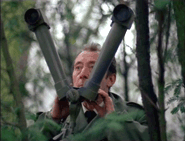Something of a wry spiritual ancestor to Harun Farocki’s 1990 found film montage, How to Live in the German Federal Republic on the pervasiveness of efficiency training and preparedness exercises in German society and their intrinsic reflection of a people’s stunted growth, repressed conformity, and evasion of human experience in a climate of increasing economic competition and ever-refining (and consequently, more dehumanized) industrial production, Alexander Kluge’s Strongman Ferdinand is a bracingly prescient, humorous, astute, and understated satire on the obsessive culture of rote rehearsals, role-playing, and fear-mongering as delusive reinforcement towards an (otherwise) insupportable effectiveness and self-justification under an ambiguous, and largely untenable, responsibility of upholding security. An early argument between the stocky, middle-aged detective (and quintessential Napoleonic figure) Ferdinand Rieche (Heinz Schubert) and a superior officer following the botched police pursuit of a burglary suspect reveals Rieche’s underlying ideology in his obsessively inhabited role as security expert, insisting that the escaped suspect should have been apprehended prior to breaking into the house when the crime had not yet been committed – a pre-emptive that would have ensured, not only a successful arrest, but also the safety of the pursuing officers who, with their lax training and marginal shooting accuracy, were destined to miss their fleeing target. Falling out of favor with his superior officers for his constant insubordination, Rieche is relegated to a dead end desk job until an opportunity for a position as security expert opens up following the sacking of a security chief for an industrial corporation auspiciously called Deutsche Neuropa (an allusion to the emergence of a new Europe under Nazi-era Germany) in the aftermath of a worsening scandal involving his controversial deployment of snipers to subdue protestors, and his subsequent cavalier statements to the press on his instituted policies that has brought even more unwanted attention to the image-conscious multinational company. Having assumed the responsibility of chief security officer under a six month conditional employment, Rieche is eager to make a strong impression over his irreplaceable (and more importantly, immeasurable) value to his new employers – in particular, a skeptical executive, Wilutzki (Gert Günther Hoffmann) who was not consulted during the board’s decision to recruit him – by seeking to dramatically (or at least palpably) transform the security operations of the industrial complex while restoring the legality of their enforcement and mitigating any potential scandal that could fall into the hands of the press (in one comical encounter, Rieche rejects an informant’s complaint of sexual indiscretion between amorous co-workers by countering that his corroborating proof was verbal and not visual). Nevertheless, despite implementing a series of security and detection measures (including a lockdown of offline areas during non-working hours that traps a bemused cleaning lady in the utility room), reinforcing classroom theory (a return to the discipline of intelligence gathering that Rieche believes will prove useful during indeterminate interrogations), and conducting elaborate field maneuvers that begin to resemble battlefield combat and guerilla warfare, the industrial complex soon falls prey to a targeted, coordinated night-time bombing in an apparent – and ultimately unsolved – act of sabotage. Emboldened by his new corporate mandate to secure the plant and handle the media in such a way that the public does not begin to question the integrity of their products, Rieche embarks on an increasingly maniacal quest to ensure the security of the industrial complex by attempting to inhabit the mindset of the agitators whom he believes to be behind the attack (a predisposition towards blaming the left movement that is suggested in his earlier purchase of Marxist literature at a bookstore for research purposes), inevitably resorting to his own perpetrated acts of theft, intimidation, and sabotage under the expedient justification of enforcing security. At the heart of Kluge’s penetrating and profoundly relevant exposition is Rieche’s assumed – and largely inflated – role as the guardian (or more appropriately, exterminating angel) of Security, a self-anointed posture that conceals his incompetence, systematic abuse of power, and arrogant excesses under an inherently corrupt policy of strong-armed tactics, unchecked authority, and willful disregard of legal consequences. Framing Rieche’s paradoxical, self-perpetuating act of terrorism as a sensationalist, cautionary statement on the perils of terrorism itself, Kluge presents a potent metaphor for the vicious circle of violence and exploitation, where the idealistic goal of a noble end no longer justifies the draconian means, but metastasizes into a grotesque inhumanity and corrupted, if amnesic consciousness.
© Acquarello 2007. All rights reserved.
